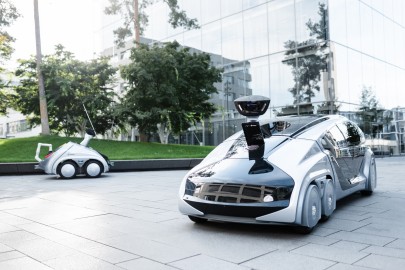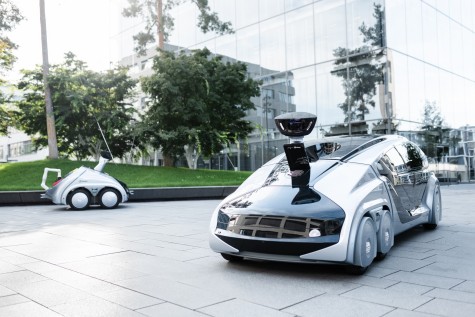Background
Urban traffic is characterized by high traffic density and congestion, pronounced emissions and noise, and the usage of large areas of land. At the same time, the transport potential of traffic is not fully exploited. These problems will not be solved even by electrification and automation of private transport and therefore require a holistic mobility concept to maximize ecological and economic efficiency.
Aims
Following the vision “Our city of the future is clean, safe, worth living in, friendly, quiet and smart” of EDAG Engineering GmbH, the idea of such a holistic mobility concept in form of the so-called CityBot ecosystem has been developed. The core element of the ecosystem is the CityBot presented by EDAG Engineering GmbH at the IAA 2019 as a networked, autonomous and locally emission-free robotic vehicle, whose drive module can perform a variety of tasks in urban traffic by coupling with various utility modules such as passenger cell, cargo carrier or city cleaning device.
The goal of the interdisciplinary project “Campus FreeCity” is now to develop the vision of the CityBot ecosystem for a first practical application and to implement it in a real laboratory. The Arena of IoT (Deutsche Bank Park – Eintracht Frankfurt) serves as a laboratory environment in which the CityBot ecosystem with a CityBot for passenger transport, a CityBot for goods transport and the elements of the control system is to be operated and evaluated.
Method
The project started with the official handover of the funding decision on 24 November 2021, is scheduled to run until May 2024 and is divided into two phases. In the first, 21-month phase, the vehicles and control system elements will be developed as essential components of the complex CityBot ecosystem for the laboratory environment. In the second, 9-month phase, the CityBot ecosystem will be implemented and evaluated in the real laboratory for the first time.
The role of the Institute of Ergonomics and Human Factors of the Technical University of Darmstadt is to develop and evaluate, in accordance with the human-centered design process, the visual human machine interface (HMI) of the CityBots, which serves the interaction between the user groups such as pedestrians and passengers and the CityBots, and the HMI in the control center, which serves the interaction between the operators and the CityBots. While the HMI of the CityBots is highly relevant for the acceptance and safety as well as for the efficiency, comfort and user experience during the interaction with the CityBots for all user groups, the HMI of the control center serves for coordination, control, monitoring and intervention by operators in case of incidents during the operation of the CityBots.
Partners
Besides the Technical University of Darmstadt with the participating institutes (SuR; IMS; BST; WINF; IAD), the project partners include the House of Logistics and Mobility (HOLM) GmbH as consortium leader, EDAG Engineering GmbH as project initiator, EintrachtTech GmbH, T-Systems International GmbH, COMPREDICT GmbH, DEKRA Automobil GmbH, Fulda University of Applied Sciences as well as FES, Mainova and DPD (associated).
Funding
The project is sponsored by the German Federal Ministry for Digital and Transport (BMDV) as part of the “Digitization and Artificial Intelligence in Mobility” action plan with around 11 million euros, of which around 1.5 million euros are allocated to the Technical University of Darmstadt.

















